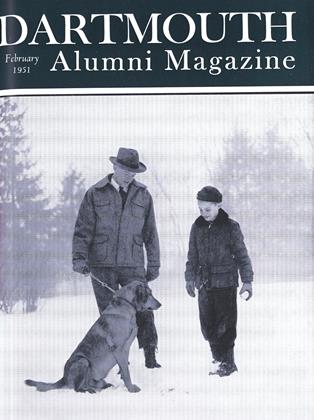WHEN Dartmouth undergraduates returned to Hanover after the Christmas recess they began to show some of the enlistment jitters that were manifested on so many college campuses across the country that the word "panic" was used by the newspapers to describe the situation. What had happened was that many students had checked up on their draft status while at home and had learned that notices to report for physical examinations were coming their way in the near future. The selective service regulations at that time stipulated that although students were automatically deferred for the remainder of the college year, notice to report for a physical earmarked a man for the Army as of that date and made it impossible for him to enlist in the Navy, Marines, Air Force or any other branch of the service he might prefer.
By mid-January, Dean Neidlinger told The Dartmouth, ai undergraduates had left college to enlist and thus get the jump on their draft boards. This number hardly constituted a "panic" on the Dartmouth campus, but there was a chance of a great increase in the number of withdrawals, particularly at the end of the semester. Meanwhile, educators and others deplored the selective service policy that was encouraging men to drop their college studies in order to have a free choice about their branch of military service.
On January 19 the Department of Defense took action to prevent the rush of enlistments by college students, announcing that effective at once a notice to report for a physical examination would not rule out a chance to enlist later on. Under the revised ruling, college students, if there are any openings, can enlist "at any time in the two months immediately preceding the final month of their school year." Good news to the college world was the statement that the government viewed the wholesale withdrawals from college at this time as "waste to the nation and damage to the educational system."
This turn of events made a good prophet out of Dean Neidlinger, who was besieged by so many students right after Christmas recess that he wrote a long, open letter to The Dartmouth summarizing the various factors and giving his personal views concerning them. His advice, in brief, was that staying subject to the draft was a risk worth taking. Those who placed their money on the Dean to win have had the satisfaction of collecting.
 View Full Issue
View Full Issue
More From This Issue
-
 Article
ArticleThe Student Days of Richard Hovey
February 1951 By EDWARD C. LATHEM '51 -
 Class Notes
Class Notes1929
February 1951 By F. WILLIAM ANDRES, EDWIN C. CHINLUND, JACK D. GUNTHER -
 Article
ArticleSIGHTED and SUNK
February 1951 By JOHN HURD '21 -
 Class Notes
Class Notes1918
February 1951 By ERNEST H. EARLEY, DONALD L. BARR, DAVID L. GARRATT -
 Class Notes
Class Notes1933
February 1951 By GEORGE F. THERIAULT, LEE W. ECKELS -
 Class Notes
Class Notes1905
February 1951 By GEORGE W. PUTNAM, GILBERT H. FALL
C. E. W.
-
 Article
ArticleNo Ivory Tower on Costs Either
June 1946 By C. E. W. -
 Article
ArticleEditorial Board
March 1947 By C. E. W. -
 Article
ArticleA Fee Is Added
May 1949 By C. E. W. -
 Article
ArticleArmy Unit Added
February 1951 By C. E. W. -
 Article
ArticleSituation Stabilized
March 1951 By C. E. W. -
 Article
ArticleA Wah Hoo Wah!
November 1953 By C. E. W.







